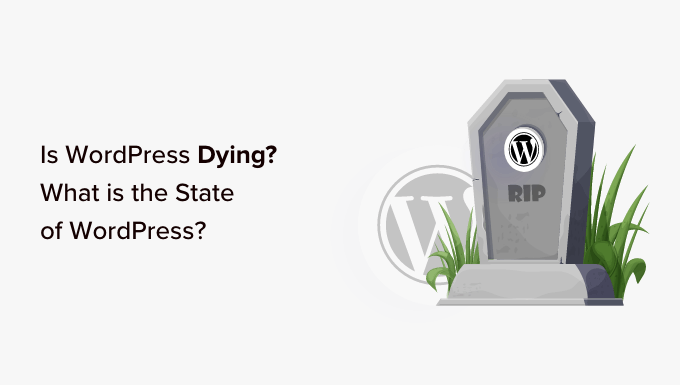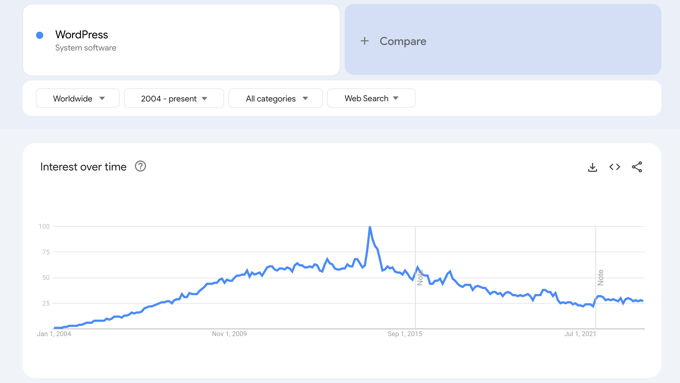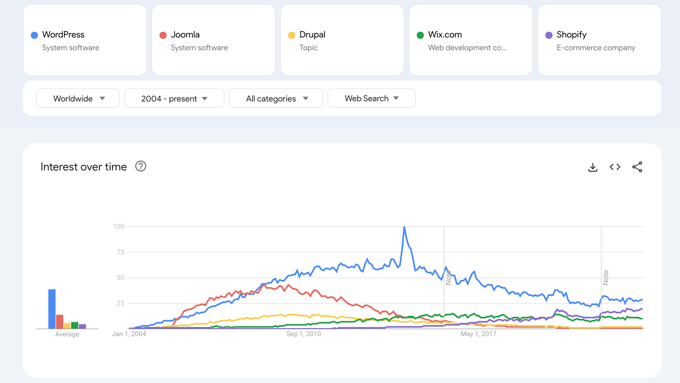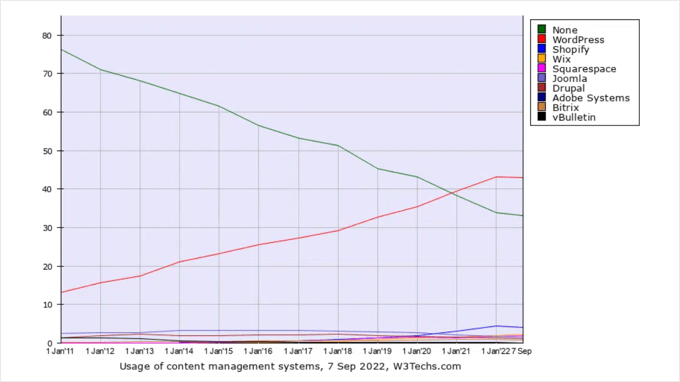Have you seen claims and rumors that WordPress is dying or about to be replaced by some newer website builder or software?
You may be wondering if the rumors are true. Maybe you are even questioning whether it’s worth using WordPress at all.
In this article, we will take a look at the state of WordPress to show you there’s absolutely no truth to the rumors that WordPress is dying.

Why Are There Rumors About WordPress Dying?
Some people are spreading rumors to discourage you from building a WordPress website. They may make claims on Twitter or Reddit that WordPress is dying or even write full blog posts about it.
It’s hard to know why. Maybe when they see the huge success of WordPress, they wonder how long it can continue. Or maybe they are using an alternative to WordPress that they are convinced is about to take over the world.
Whatever their motives, when you look at the facts, these rumors are simply not true. There is absolutely no indication that WordPress is dying or its loyal users are about to abandon it.
With that being said, let’s take a careful look at the state of WordPress to see if there is any reason to believe that WordPress is dying. You can use the quick links below to jump to different parts of our article:
WordPress in Google Trends
We will start by looking at WordPress search volume. We will start here because these figures are often used as evidence that interest in WordPress is declining.
Here is a graph from Google Trends showing search interest in WordPress since 2004.

This graph shows that there was an astonishing level of search interest in WordPress around 2014. However, there is still a lot of interest in WordPress today.
You can’t easily see that by looking at the graph above. So let’s add some context. Here is the same graph, but this time we have added some of the top WordPress alternatives.

You can see that there is more search interest in WordPress than in any other content management system (CMS).
Recently, you can see that searches for alternatives like Wix and Shopify have been increasing. These platforms may be easier for beginners to get started with.
However, over time, many users become frustrated with their lack of customization or that they can’t run these websites on their own servers. You can learn more in our comparisons of Wix vs. WordPress and Shopify vs. WooCommerce.
WordPress Market Share
Now that we have looked at search volume, you may be wondering how many websites are actually using WordPress and how that compares with other web platforms.
In short, WordPress dominates the market. No other platform comes close.
Currently, more than 43% of all websites are using WordPress as their content management system. That’s 810 million websites in total. And WordPress holds nearly 65% of the global CMS market share.
Also, WordPress is being used by the most successful companies. 38% of the top 10,000 websites are powered by WordPress. WordPress powers websites for big-name brands, including Disney, Sony, Facebook, and more.
This graph from W3Techs can help you visualize WordPress’s huge market share.

You can see that websites that don’t use a content management system (green line) have been steadily declining. Meanwhile, WordPress adoption (red line) has been steadily growing, and other content management systems barely register on the graph.
For example, Shopify is the second most popular, but it only powers about 4.4% of all sites, and Wix spends tens of millions in marketing, but it only powers 1.9%.
WordPress is alive and well, and it’s hard to believe that over 43% of website owners who have carefully chosen WordPress are all suddenly going to change their minds.
The State of WordPress Security
Having such a large market share, WordPress is a common target of hacking attempts, DDOS attacks, malware, and trojans.
The good news is that WordPress core goes through rigorous security audits, and it’s more secure than many other platforms.
However, you can never take website security for granted. Statistics from Sucuri, a leading website security company, show that about 97% of WordPress website hacks occur when their owners don’t follow safe security practices:
- 39% of hacked WordPress websites were using an outdated version of the software. That’s why you should always use the latest version of WordPress on your website.
- Nearly 50% of WordPress sites are affected by a security vulnerability caused by an outdated or poorly-coded WordPress plugin or theme.
- Around 8% of WordPress sites were hacked due to a weak password.
You can make your WordPress site as secure as possible by following some basic security best practices. To learn more, see our complete WordPress security guide for step-by-step instructions.
The State of WordPress Updates
WordPress has been around since 2004. However, the software is regularly updated to add new features and keep the user interface current.
WordPress is an open-source project and is driven by a global community of users. This means that anyone can contribute to the project in many different ways:
- The WordPress translation community has fully translated the CMS into over 50 languages and partially translated more than 200.
- WordPress communities around the world organize multiple WordCamps each year, as well as thousands of other meetups in various countries.
- There are dozens of WordPress groups on Facebook, with WPBeginner Engage being the largest WordPress Facebook group with 97,000+ members.
The development team releases updates several times a year, such as WordPress 6.3, which was released in August 2023. These can include bug fixes, security updates, and new features.
Past WordPress update highlights include the Gutenberg block editor, which lets you easily add new elements to blog posts using blocks. The full site editor works in a similar way with customizing themes. And the command palette tool lets you be productive by quickly doing tasks from the keyboard.
Every year, the platform becomes more powerful and user-friendly. If you take a look at our article on the evolution of the WordPress user interface, then you will see at a glance how modern the latest interface is.
Besides the new features in WordPress itself, you can also add new features using plugins.
The State of WordPress Plugins
The biggest reason behind WordPress’s popularity is its large plugin ecosystem. No other web platform has as many to choose from.
Plugins are like apps for your WordPress website. You can install them to add new features to your site and extend its functionality. To learn more, see our guide on WordPress plugins and how they work.
There are more than 60,000 free WordPress plugins in the WordPress.org Plugin Directory alone. Currently, the 61 top WordPress plugins are installed on more than 1 million websites, and 9 of those plugins are installed on 5 million+ websites.

With a healthy plugin ecosystem, you can add custom functionality to your website at a fraction of the cost of custom development.
There are free WordPress plugins available for just about every type of website functionality, including contact forms, selling memberships, landing page builders, and SEO optimization.
Whatever feature you wish to add to your WordPress website, you are sure to find a plugin that can do it.
The State of WordPress Themes
Themes control the appearance of a WordPress website. They are WordPress-specific web design templates that you can install on your site to change the way it looks.
The WordPress theme ecosystem is very rich. There are thousands of free and paid WordPress themes available, offering WordPress users an endless combination of design, layout, color schemes, and features.
WordPress.org’s free theme directory has more than 10,000 free WordPress themes.
Besides this, there are many excellent premium themes like Divi and Astra. You can even build your own custom theme with SeedProd. No other CMS platform offers the same level of customization as WordPress.
The WordPress Economy
While WordPress itself is free, it has inspired a thriving, multi-billion-dollar ecosystem that creates thousands of jobs all over the world. These include freelancers, developers, and companies that sell WordPress-related products and services.
Thousands of WordPress jobs are currently open on many popular freelancing websites and job boards. The average hourly rate for WordPress developers can be anywhere between $20-$100 per hour, depending on their expertise and the job at hand.
There are hundreds of small and large businesses, agencies, and developers selling WordPress-related products. You can see our list of the most influential WordPress businesses and companies and what they do.
These companies are highly invested in WordPress and strongly contribute to its success.
The State of WPBeginner and Awesome Motive
As you know, WPBeginner and our management company, Awesome Motive, completely rely on WordPress for our success. We have no doubt that WordPress is alive and well and is the best choice for you to build your website.
That’s why we create WPBeginner tutorials, YouTube videos, and premium WordPress video tutorials to help small businesses grow and compete with the big guys.
We also create many plugins and tools like All in One SEO, SeedProd, MonsterInsights, and WPForms so that you can create a successful website that does everything you need.
Thanks to our awesome community, WPBeginner and Awesome Motive have continued to grow year after year.
In 2022, we reached a huge milestone. We were featured on the NASDAQ billboard in Times Square for passing 20 million active installs of our products.

That was huge, but we soon reached an even bigger milestone. In 2023, we were featured on the NASDAQ billboard again for passing 25 million active installs of our products.
As a result, our confidence in WordPress is bigger than ever. We have continued to invest more resources in WordPress and hire new staff, and now have over 300 team members in 50+ countries. We only see the success of WordPress growing and want to be part of it.
We hope this tutorial reassured you that the state of WordPress is alive and well. You may also want to see our guide on how much it costs to build a WordPress website or our expert pick of the best WordPress hosting to get started with your own website.
If you liked this article, then please subscribe to our YouTube Channel for WordPress video tutorials. You can also find us on Twitter and Facebook.





Syed Balkhi says
Hey WPBeginner readers,
Did you know you can win exciting prizes by commenting on WPBeginner?
Every month, our top blog commenters will win HUGE rewards, including premium WordPress plugin licenses and cash prizes.
You can get more details about the contest from here.
Start sharing your thoughts below to stand a chance to win!
Mrteesurez says
Based on these information you gave now, I see WordPress still thriving in 2024, and beyond. Being an open source is one of the main reasons for it’s rapid grow over the years, it gives everyone freedom to distribute, integrate, build and build upon WordPress and this has created more jobs for people around the world.
Jiří Vaněk says
In my opinion, a system that powers approximately 40 % of the entire internet won’t just die out. As you mentioned, WordPress is a huge money-making machine and currently employs a vast number of people directly or indirectly. If WordPress lost support overnight, a massive number of people on the internet would face significant issues in resolving their new websites. WordPress is a well-oiled machine that, in my view, won’t be stopped by anything easily. This is also proven by the WordPress community itself, which is simply amazing.
Sean Wichert, Sr. says
2 ways WP can grow (imo).
1. Shipping (for dummies)
2. User Accounts (Signup/in/out + logged in UX/UI. (Social Networks make it painless for dummies to join and navigate their user accounts.)
Thanks for reading and I enjoy your content.
WPBeginner Support says
Thank you for sharing what you feel should be added. Those two features are not in core but there are plugins to help you achieve both of those
Admin
John Bryer says
Are “we” referring to wordpress.com or wordpress.org? In my opinion, wordpress.com is getting worse. The free themes are getting uglier to the point of unusability. You’d have to upgrade to the business (Creator) plan to get a quality theme, which is unacceptable for a beginner or small business at the rate of $300 a year. There was a time when one could get a premium theme for a plan of about $96 a year, but not anymore.
WPBeginner Support says
We mainly mean WordPress.org sites but WordPress.com does help with the number of new sites for those looking to start a new site but not wanting to invest too much when getting started.
Admin
Jiří Vaněk says
Yes, I have a similar opinion on the matter, and that’s why I have already moved several people from WordPress.com to WordPress.org. These were people with a limited budget, and in the end, we agreed that we couldn’t meet their budget on .com. With WordPress.org, we are only limited by the performance and cost of the web hosting. The rest is up to us, and we were basically able to complete everything for a third or even lower cost. So exactly, WordPress.com certainly has some advantages, but for low-budget websites, it soon won’t be suitable at all. Thankfully, there is an alternative.
Moinuddin Waheed says
it’s like saying something while hiding the face in the desert like ostrich.
The stats itself is a proof that wordpress is not only relevant today as it used to be but also growing faster than ever.
The fact that everyone can use it without having to hire developer and make online presence of their businesses will let it to remain relevant in the times to come.
The same arguments are made for php as well. But I can see people using php and frameworks like laravel make it as robust as ny other platforms.
Same is true for wordpress.
Long live wordpress community.
Jiří Vaněk says
I don’t think WordPress will suffer from this. However, what I see around me is that people have become lazier online. Instead of written content, they prefer YouTube tutorials, and many have started using artificial intelligence to solve problems. So, classic WordPress blogs, including mine, now have to strive to be more creative to attract people to their content. It’s a bit of a challenge, but one that I enjoy. So, rather than just about WordPress, it’s more about the content because times are changing.
WPBeginner Support says
Instead of saying lazy, it is better to say that users have changed their preferences and if your users prefer new content it is a good idea to look into the content they prefer and see how you can use that to improve your content.
Admin
Ralph says
WordPress is dying as much as it was dying in 2010, 2015, 2020 etc.
People who don’t want to use it for some reason will say that and rest of will happily make our websites with wordpress. And these websites will be read by millions so… Let’s back to this topic in 5 years and come to the same conclusions
Nuno says
I was also checking that… many of my contacts said that WordPress is dying. Lack on the internal development, feature more free options, to be more stable and faster, instead of many 3rd party plugins and is not so safe, they are so slow!
On the other hand Shopify is growing a lot, websites are super faster and got what people need.
WPBeginner Support says
We hope our guide gave you another perspective on the status of WordPress.
Admin
Pete says
But isn’t WordPress dying any way so why bother?
WPBeginner Support says
We would recommend reading the article above
Admin
Xavier O'Neill says
This, and ‘needing a website’is dying’. All unfounded myths. The entire tech industry is investing billions in website related technologies, but a few opinionated people lacking businesse sense know better. A much needed, well-written article – backed by facts!
Devansh Thakkar says
WordPress is Great!
It’s gonna be growing a lot in future.
WPBeginner Support says
We hope so too
Admin
Marc says
Rumours are just that and I’m pleased you put it all in context.
WPBeginner Support says
Glad we could help clear some things up in this regard
Admin
Anil Shukla says
how is facebook powered/using wordpress???
WPBeginner Support says
Their newsroom subdomain used WordPress, the Facebook main site is built using something else
Admin
Srinivasa Chaithanya says
Good idea to write these type of articles and rank for such stupid keywords and answer them properly.
I myself have been using wordpress since 2012 and I never even bothered to look at other cms
WPBeginner Support says
Glad you feel our article was helpful!
Admin
anshuman sahu says
the truth is its dying slowly unless there is a rapid development to keep it alive to keep it up eoth layest technologies given that it can still be a good backend
WPBeginner Support says
Thank you for sharing your opinion, there is also a concern with the latest technologies that they are not fully tested to consider
Admin
nvoi says
not sure why you’d say it’s dying slowly. when you’re looking at headless CMS, WP has a decent market share as well. I do agree though that efforts should be made to talk about the headless capabilities more and make it easier for developers to get started (e.g. cloud deployment on .com similar to other headless CMS).